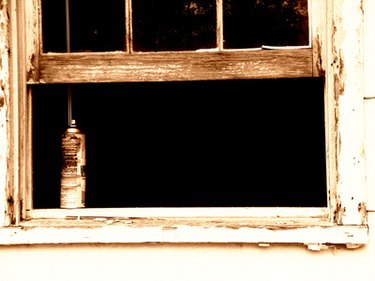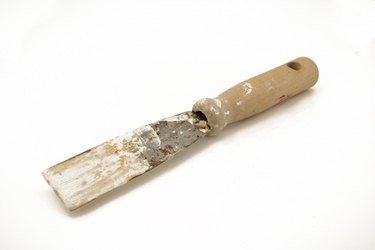Things You'll Need
Larger container for holding hot water
1-inch putty knife
Microwave oven (plastic tubs only) (optional)
Conventional oven (metal cans only) (optional)

Oil-based glazing compound is a white, clay-like putty that has long been used to fix wooden frame windows. But sometimes you may open the container to find that the glazing compound is hard and unworkable. It may be old, or perhaps the container wasn't sealed properly after the last use, allowing air in to dry out the compound. Depending on the compound's age and consistency, you can often revive it, avoid another trip to the store and get on with your project.
Step 1

Probe the glazing compound with putty knife or your finger. If it's stiff but somewhat pliable, remove about 1/2 cup of the product and work it with your hands, as you would with modeling clay, until it warms and softens. If it's hard, proceed to step 2.
Video of the Day
Step 2
Place the tightly closed glazing compound can or tub in a larger container, such as a coffee can or ice cream bucket. Fill container with hot water to cover the sides of the compound container. Wait 10 minutes.
Step 3
Mix, with a putty knife or your hands, to incorporate the warmer compound from the outside edges of container with the cooler compound from the center. Repeat the 10-minute soak with fresh hot water if necessary.
Step 4
Place container of glazing compound that still hasn't softened in a conventional oven set at 170 degrees (metal cans only) or in a microwave oven (plastic containers only). For a conventional oven, check after 10 minutes. For the microwave oven, start with 30 seconds on high per 16 oz. of compound and repeat if needed. Mix with your hands or the putty knife to incorporate the warmer parts of the compound.
Step 5
Discard the compound and replace with new product if it remains unworkable.
Tip
Seal all containers completely when finished to avoid wasted product. Place a small piece of plastic wrap directly over compound before sealing to protect it from air inside the container.
Warning
Use caution when using hot water and warming the compound in the oven. Wear rubber gloves to protect your hands, and start with small heat increments and short times before increasing.
Video of the Day